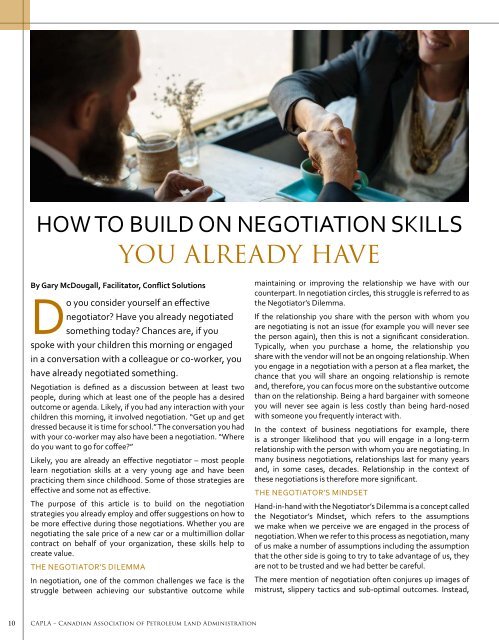NEXUS December 2017 online version
You also want an ePaper? Increase the reach of your titles
YUMPU automatically turns print PDFs into web optimized ePapers that Google loves.
HOW TO BUILD ON NEGOTIATION SKILLS<br />
YOU ALREADY HAVE<br />
By Gary McDougall, Facilitator, Conflict Solutions<br />
Do you consider yourself an effective<br />
negotiator? Have you already negotiated<br />
something today? Chances are, if you<br />
spoke with your children this morning or engaged<br />
in a conversation with a colleague or co-worker, you<br />
have already negotiated something.<br />
Negotiation is defined as a discussion between at least two<br />
people, during which at least one of the people has a desired<br />
outcome or agenda. Likely, if you had any interaction with your<br />
children this morning, it involved negotiation. “Get up and get<br />
dressed because it is time for school.” The conversation you had<br />
with your co-worker may also have been a negotiation. “Where<br />
do you want to go for coffee?”<br />
Likely, you are already an effective negotiator – most people<br />
learn negotiation skills at a very young age and have been<br />
practicing them since childhood. Some of those strategies are<br />
effective and some not as effective.<br />
The purpose of this article is to build on the negotiation<br />
strategies you already employ and offer suggestions on how to<br />
be more effective during those negotiations. Whether you are<br />
negotiating the sale price of a new car or a multimillion dollar<br />
contract on behalf of your organization, these skills help to<br />
create value.<br />
THE NEGOTIATOR’S DILEMMA<br />
In negotiation, one of the common challenges we face is the<br />
struggle between achieving our substantive outcome while<br />
maintaining or improving the relationship we have with our<br />
counterpart. In negotiation circles, this struggle is referred to as<br />
the Negotiator’s Dilemma.<br />
If the relationship you share with the person with whom you<br />
are negotiating is not an issue (for example you will never see<br />
the person again), then this is not a significant consideration.<br />
Typically, when you purchase a home, the relationship you<br />
share with the vendor will not be an ongoing relationship. When<br />
you engage in a negotiation with a person at a flea market, the<br />
chance that you will share an ongoing relationship is remote<br />
and, therefore, you can focus more on the substantive outcome<br />
than on the relationship. Being a hard bargainer with someone<br />
you will never see again is less costly than being hard-nosed<br />
with someone you frequently interact with.<br />
In the context of business negotiations for example, there<br />
is a stronger likelihood that you will engage in a long-term<br />
relationship with the person with whom you are negotiating. In<br />
many business negotiations, relationships last for many years<br />
and, in some cases, decades. Relationship in the context of<br />
these negotiations is therefore more significant.<br />
THE NEGOTIATOR’S MINDSET<br />
Hand-in-hand with the Negotiator’s Dilemma is a concept called<br />
the Negotiator’s Mindset, which refers to the assumptions<br />
we make when we perceive we are engaged in the process of<br />
negotiation. When we refer to this process as negotiation, many<br />
of us make a number of assumptions including the assumption<br />
that the other side is going to try to take advantage of us, they<br />
are not to be trusted and we had better be careful.<br />
The mere mention of negotiation often conjures up images of<br />
mistrust, slippery tactics and sub-optimal outcomes. Instead,<br />
10 CAPLA – Canadian Association of Petroleum Land Administration


